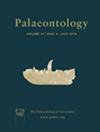北非泥盆纪三叶虫形态差异趋势
IF 2.3
2区 地球科学
Q1 PALEONTOLOGY
引用次数: 4
摘要
泥盆纪是一个剧烈的环境变化时期,它塑造了三叶虫的形态。本研究旨在探讨它们的形态演变,并揭示一些非生物和生物因素(测深、摄食习惯和视觉能力)对它们形状的影响。利用几何形态计量学方法,编制了一个数据集来研究北非泥盆纪三叶虫的三个结构(头体作为一个整体,头体的中心部分和髋部)的形状。基于经验形态空间,定量分析了泥盆纪各阶段的形态变化。结果显示,在眉骨形状、面部缝线位置、臀肌长度和脊柱存在的形态学差异方面存在重要差异。在洛奇科夫语中,形态差异很低,随后在布拉格语中随着许多创新而增加,并在埃姆西亚语中达到最大值。如果形态空间的占有一直持续到象鼻纪,那么在以重要的环境变化而闻名的纪梵纪就发生了严重的差异丧失。在泥盆纪晚期,差异仍然很低。从志留纪继承下来的形状在整个泥盆纪持续存在,而布拉格的新奇事物则受到损失的影响最大。这些持久的形状更利于环境适应,帮助这些三叶虫在环境事件中生存下来。同样,在泥盆纪事件中幸存下来的三叶虫目具有广泛的形态谱,能够更好地适应环境变化。本文章由计算机程序翻译,如有差异,请以英文原文为准。
Morphological disparity trends in Devonian trilobites from North Africa
The Devonian was a time of drastic environmental change that shaped the morphology of trilobites. This study aims to investigate their morphological evolution and to show the influence of some abiotic and biotic factors (bathymetry, feeding habits and visual abilities) on their shape. A dataset was compiled to investigate the shape of three structures (cephalon as a whole, central part of the cephalon, and pygidium) of Devonian trilobites from North Africa, using a geometric morphometric approach. Based on empirical morphospaces, the morphological changes were quantified through the Devonian stages. The results reveal important variations in the morphological disparity of the glabella shape, the facial suture location, the pygidial length and the presence of spines. In the Lochkovian, morphological disparity was low, subsequently increased in the Pragian with numerous innovations, and reached a maximum in the Emsian. If the morphospace occupancy remained until the Eifelian, a severe loss of disparity occurred in the Givetian, a time known for important environmental changes. Disparity then remained low in the Late Devonian. The shapes inherited from the Silurian persisted throughout the Devonian whereas Pragian novelties were most affected by losses. These persistent shapes were more versatile for environmental adaptation, helping those trilobites to survive the environmental events. Similarly, the trilobite orders that survived Devonian events had a wide morphological spectrum and were better adapted to withstand environmental change.
求助全文
通过发布文献求助,成功后即可免费获取论文全文。
去求助
来源期刊

Palaeontology
地学-古生物学
CiteScore
5.60
自引率
3.80%
发文量
43
审稿时长
6 months
期刊介绍:
Palaeontology publishes a wide variety of papers on palaeontological topics covering:
palaeozoology
palaeobotany
systematic studies
palaeoecology
micropalaeontology
palaeobiogeography
functional morphology
stratigraphy
taxonomy
taphonomy
palaeoenvironmental reconstruction
palaeoclimate analysis and biomineralization studies.
 求助内容:
求助内容: 应助结果提醒方式:
应助结果提醒方式:


